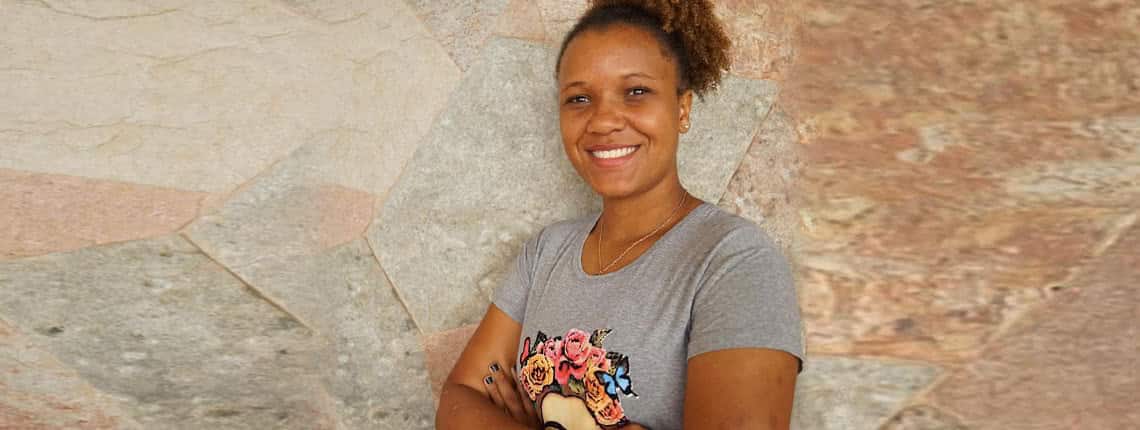Je m’appelle Jennifer Thaís Santos Fernandes, j’ai 25 ans et je suis récupératrice de matériaux, une jeune femme noire. Je travaille, et ce , depuis l’âge de 16 ans, au sein de l’ASCITO, une association de récupératrices et de récupérateurs de matériaux, établie à Itabirito, une ville de la région métropolitaine de Belo Horizonte dans le sud-est du Brésil.
La gestion des déchets s’est toujours manifestée dans ma vie sous différentes formes. Lorsque j’étais enfant, moi et mes frères accompagnaient notre mère à la décharge de Ribeirão das Neves pour l’aider au travail, parce que si nous étions plus nombreux à travailler, nous risquerions moins de crever de faim.
Déjà même à l’époque, l’ASCITO faisait partie du Mouvement national des récupérateurs de matériaux (MNCR) et, de ce fait, nous participions toujours aux discussions et aux luttes en faveur de notre cause. C’est alors que j’ai réalisé que je pouvais y prêter main-forte en contribuant à la représentation politique du groupe. Par les liens que j’ai tissés avec d’autres récupératrices·eurs de matériaux, je me suis sentie responsabilisée.
Suite à la formation professionnelle que nous avons reçue, le MNCR a vu poindre en son sein une demande et un intérêt pour la formation sur les questions de genre.
En 2012, grâce au soutien de WIEGO, « As Bonitas » (Les plus jolies), le mot « bonitas » rappelant un slogan en portugais qui dit en français « une jolie femme est une femme qui se bat », est née. De 2012 à 2020, WIEGO et As Bonitas ont organisé des ateliers pour discuter de divers thèmes liés aux questions de genre et, en 2020, malgré les défis induits par la pandémie, nous avons élaboré notre plan d’action 2021-2023 sur le genre auquel chacun d’entre nous a contribué.
Depuis l’éclosion de la pandémie, mes compagnons et moi, travailleuse·eur·s tous de produits recyclables, nous sommes retrouvés très exposés. Pourtant, le rôle des femmes leaders au sein du MNCR n’a pas changé. Bien au contraire, elles sont restées animées de la volonté et de la détermination d’aider les travailleuse·eur·s.
Au début de la pandémie, les autorités locales nous ont à peine soutenus. C’est-à-dire qu’elles ne nous ont accordés que des aides sociales comme des paniers de provisions. L’ASCITO a fait savoir au secrétariat municipal que, l’environnement étant, nous ne pouvions pas poursuivre la collecte sélective de matériaux, sans un dialogue axé sur des mesures concrètes, notamment l’adoption de protocoles sanitaires. Pendant la suspension de la collecte de matériaux, une période où les vivres nous ont même fait défaut, nous avons bénéficié du soutien de partenaires et d’amis. Et grâce à ce soutien, nous avons pu distribuer à nos membres des paniers de provisions de base, de désinfectants à main et de l’équipement de protection individuelle (EPI).
Le MNCR a envoyé à l’avance aux associations et coopératives sous sa supervision une partie des fonds reçus de l’industrie en soutien du travail des récupératrices·eur·s de matériaux, comme le prévoit la responsabilité élargie des producteurs brésiliens, qui stipule que l’industrie doit assumer une partie des coûts de reprise des matériaux en vue du réemploi et du recyclage. Les fonds reçus ont beaucoup amélioré la situation des récupératrice·eur·s. Par ailleurs, de concert avec plusieurs partenaires, le MNCR a lancé en ligne une campagne de financement participatif, ce qui nous a permis de venir en aide également aux récupératrice·teur·s de matériaux non affiliés à l’organisation.
À mon avis, et j’y crois, les pouvoirs publics doivent voir en nous des acteurs majeurs dans le processus visant à transformer l’avenir et contribuer aussi bien à améliorer l’infrastructure de nos entrepôts qu’à investir dans la formation.
Au MNCR, les femmes et les jeunes peuvent rêver et être les artisans de leurs rêves et, comme l’a montré la pandémie, nous avons besoin les uns des autres. Fait intéressant, le MNCR a pour devise amour, gratitude et espoir, ce qui signifie qu’on a toujours quelqu’un à ses côtés et sur qui on peut compter. Cette pandémie passera et nous serons aussi bons que possible, le cœur très chaleureux en ayant servi de refuge aux uns et aux autres.
Lire l’article intégral sur Jennifer en anglais ou en portugais
Photo : Jennifer Thaís Santos Fernandes Crédit : Lina Mintz
